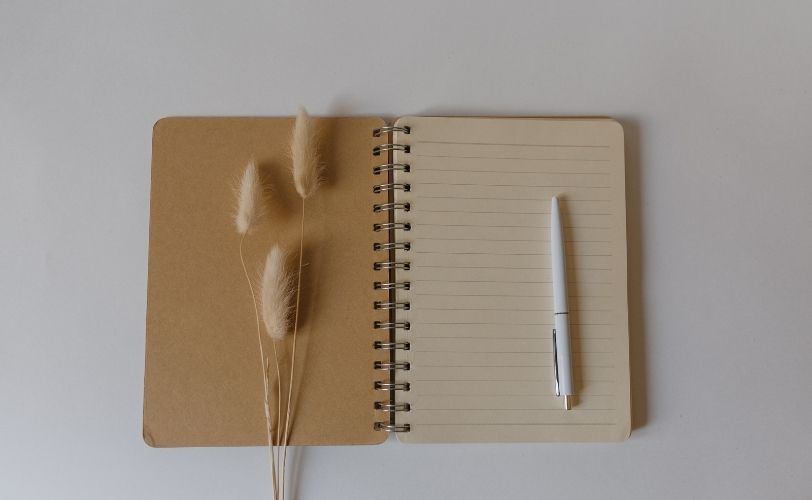How to make journaling a habit
I started journaling before I knew it was journaling. I was 13 and writing Dear Diary in any notebook I could get my hands on, spilling my teenage angst onto its pages. When I started having mental health problems, my journals felt like my only safe space, they helped me untangle my thoughts and process what was happening.

I did get the professional support I needed and recovered, but the habit of journaling stuck. My practice has evolved and changed over the years, from using guided journals to free-writing and I’m always excited to try something new. So when Sam Topley, founder of Dear Writer got in touch and asked if I’d like to try a sample of his new journal, I jumped at the chance.
Sam’s love of journaling started after he experienced a mental health crisis in his mid-twenties relating to an addiction he’d been battling and trauma experienced during the London Bridge terrorist attacks. Putting pen to paper helped him reflect and make sense of his feelings, a tool he’s now keen to share with others.
Launching via a kickstarter campaign, the Dear Writer six-week journal was a project born out of lockdown. Combining elements such as a gratitude practice, free writing exercises and (my personal favourite) Haiku prompts, the journal offers an easy and structured way to delve into the world of journaling.
While after many years the practice has now become akin to brushing my teeth every day, I know for beginners it can be tricky to make journaling a habit. So who better to go to for tips than Sam? Keep reading to learn more about common stumbling blocks and top tips for making journaling a beloved practice, not a chore.

Hi Sam! Can you tell us a little more about what you personally get out of journaling and why you think it’s so beneficial?
My opinion on writing, before I learned about the power of journaling, was that it was only for work and keeping a diary was the domain of school children. I learned about journaling as a tool for good health in my mid-twenties and immediately it clicked with me. Around that time I was at the beginning of a new journey, recovering from some unaddressed mental health issues I had been living with. I went to therapy and support groups, which were invaluable and safe spaces. I had always enjoyed writing for fun so journaling was a natural way of complementing the other work I was doing and helping me in my recovery in my own time.
At its simplest, it gave me a healthy way of having a dialogue with myself, a private space and time for me to explore and find words for things which previously had none. It gave me the daily opportunity to look at what was going on inside without judgment and get my feelings out on the table.
Daily journaling for me now is about building on and maintaining the progress I have made. Through the act of writing daily and keeping track of where I am my days are mostly calmer and when I’m anxious or busy at work they help me organise my thoughts before the day starts.
What stumbling blocks do you find people come up against when trying to make journaling a habit?
Building a journaling practice or habit is much like building any other habit. The most common stumbling block I hear is people having the intention to start but not finding the time to write, or not having the energy to start when planned, then feeling guilty for not doing it.
As with all habits, some general good advice I’ve heard is that everyone is different and what works for one person won’t work for someone else, there’s no best time to do it, no best way to write, no best length to write to, there’s only your way. So don’t be put off before you start by the fear of not doing it properly, because however you write is right.

What tips can you share to help people make journaling a habit?
Here are 5 tips:
Find what works for you: Journaling is an umbrella term and there are many different ways of writing, just like there are many different types of physical exercise. The only right one is the one that works for you. If you haven’t done any journaling before, buy a guided journal where you’ll find some structure and encouragement to write, you can build your own practice or way of writing out of that.
Make it a priority: Just like with all habits, if you don’t make it a priority the habit will keep falling down the list of things to do. Something will come up in the morning, or afternoon when you planned to write and get in the way. There will always be distractions and reasons not to write. If you make it a priority for you, you’re less likely to drop it for something else.
Embrace your imperfection: Journaling is only for you. Know that you will never do it perfectly and have no fear of that. Whatever you write, even if you don’t like it at the moment you are writing it, know that it is exactly the right thing to be writing and sometimes the words themselves are not as important as the things they uncover.
Be kind with yourself: I always advise that a writing practice is approached with an attitude of self-compassion and self-care. Writing can bring up difficult emotions as well as good ones. Having some clear structure is really important and useful if you’re new to journaling. However you write, approach the page with compassion and understanding for yourself. You can make a contract with yourself too before you start and say something like:
‘I approach this writing with an awareness that I need to care for myself. If I feel uncomfortable then I can stop and seek help. I will not judge myself for any errors or for the way things sound and will accept what comes up as what it is.’
Have fun: Journaling is a creative way of looking after yourself and it’s important to have fun with that creativity. I like descriptive journaling where I can add my own personal flourishes to my writing, and writing short-form poetry. They mostly remain private but I can edit them in a way where I am comfortable to share them with trusted friends. Sharing safely with trusted friends can be a rewarding and encouraging thing to do.
Hopefully armed with these tips you’re now feeling inspired to pick up a pen and get started. Follow Dear Writer on Instagram for more updates and check out their free prompts to get those journaling juices flowing. If you’re looking for more support in your personal development journey, use our search tool to find a coach.

Find the right business or life coach for you
All coaches are verified professionals